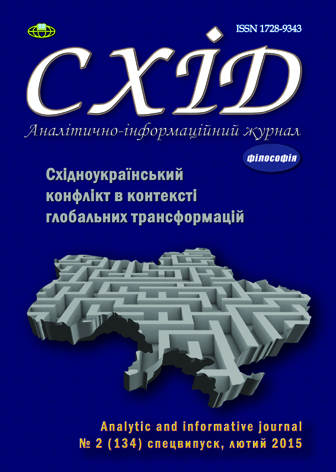"Crimean Offence": myth, its instrumentalization and geopolitical projections
DOI:
https://doi.org/10.21847/1728-9343.2015.2(134).40317Keywords:
Crimea, annexation, historical grievance, national resentment, Crimean Tatars, historical memory.Abstract
The influence of the historical memory of the "Russian Crimea" on ideological and propaganda support of the second annexation of the Crimea in 2014. Analyzed the nature and impact of the concept of "historical grievance" in the formation of modern Russian social and political discourse about the Crimea.
Although historically (national) grievance - a legacy of the past, it is important to understand exactly what is the past in each case. There are ancient grievances arising from specific historical events, injustice on the part of other nations (war, annexing, genocide). This grievance has lost a clear outline of the influence of time, and may gradually come to naught. But under certain circumstances, these memories can be "extracted" from the depths of historical memory, and become relevant. Or even appears that the origins of this "awakening" the memory of grievances are not in the past and in the present.
National grievance can play a negative role in times of economic, political and social crisis. Society often shifts the blame for their problems to people in other countries that are not related to the incident. This is also called a "national grievance". But this is another phenomenon, which is called the "national resentment".
Downloads
References
Saulkin V. Russkaya vesna. Sevastopol i Krym vernulis domoy, available at: http://ruskline.ru/analitika/2014/03/20140322/russkaya_vesna_ sevastopol_i_ krym_vernulis_domoj/. (rus).
Glavnoe v rechi Putina o Kryme, NATO i "nacional-predatelyakh" , available at: http://medialeaks.ru/features/vosem-glavnyx-tezisov-putina-o-prisoedinenii-kryma (rus).
Ignatov V. (1991), Chelovek. Bytiye. Kultura, Kiev, Pereyaslav-Khmelnytskiy, pp. 15-16 (rus).
Shnirelman V. (2003), Voiny pamiaty: mify, identichnost i politika v Zakavkazye, Moscow, 601 p. (rus).
Shtokvish O. (2013), Gileya. Zbirnyk naukovykh prats, Kyiv, 75 (№ 8), pp. 137-139 (ukr).
Korolenko B. (2011), Natsionalna ta istorychna pamiat, 1, pp. 283-303 (ukr).
Medvedev S. Russkyy resentyment, available at: http://www.strana-oz.ru/2014/6/russkiy-resentiment (rus).
Assman Y. (2004), Cultural memory: Letter, the memory of the past and political identity in the high cultures of antiquity, Moscow, 368 p. (rus).
Kon I. (1998), Psikhologiya natsionalnoy neterpimosti [Psychology of of national intolerance], Harvest, Minsk, available at: http://evartist.narod.ru /text9/13.htm. (rus).
Dmitry Bykov compares who overcomes while in Russia, with its Islamic fundamentalism analogue - and wondering what will happen next, available at: http://www.politforums.net/ukraine/1421492416.html. (rus).
Berezhkov M. (1891), Plan for the conquest of the Crimea, compiled during the reign of the Emperor Alexei Mikhailovich Slav scholar Yuri Krizhanich, St. Petersburg, 90 p. (rus).
Sergeyev A. (1916), Izvestiya Tavricheskoy uchenoy arkhivnoy komissii, № 53, pp. 190-193 (rus).
Legendy i predaniya Kryma (2003), Symferopol, pp. 298-387 (rus).
Resolution GFCS [State Defense Committee of the USSR] № 5859 cc from May 1, 1944 "On Crimean Tatars", available at: http://www.archives. gov.ua/Sections/Crimea_60/photos_03.php?1 (rus).
Istoki antizapadnichestva, available at: http://pora-valit.livejournal. com/3127313.html (rus).
Downloads
Published
How to Cite
Issue
Section
License
Copyright (c) 2015 Olexandr Shtokvysh, Bogdan Korolenko

This work is licensed under a Creative Commons Attribution-NonCommercial-NoDerivatives 4.0 International License.
1. Authors bear responsibility for the accuracy of facts, quotations, numbers and names used.
2. Manuscripts are not sent back.
3. The publisher does not always agree with the authors' opinion.
4. The authors reserve the right to authorship of the work and pass the first publication right of this work to the journal under the terms of a Creative Commons Attribution-NonCommercial-NoDerivatives 4.0 International License. This license allows others to distribute (copy) the published work for non-commercial purposes, provided there is mandatory attribution to its authors and a link to the first publication in our journal.
5. The authors have the right to conclude separate supplement agreements that relate to non-exclusive work distribution in the form in which it has been published by the journal (for example, to upload the work to the online storage of the journal or publish it as part of a monograph), provided that the reference to the first publication of the work in this journal is included.

